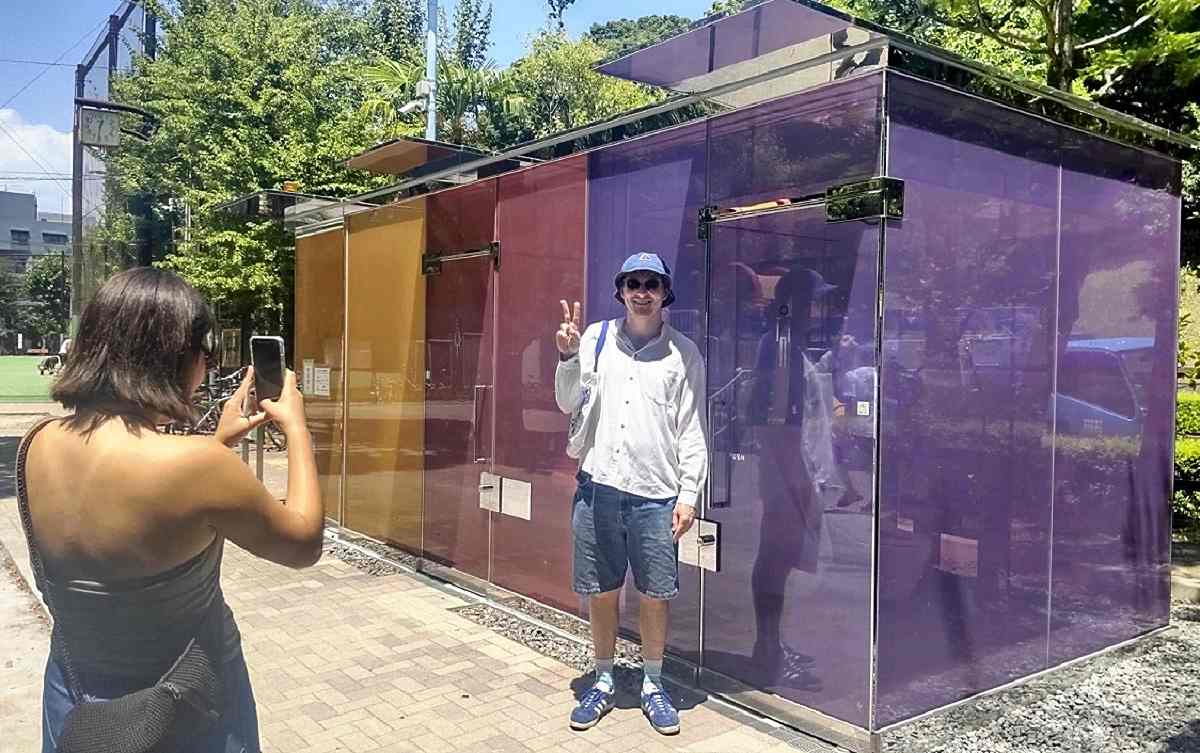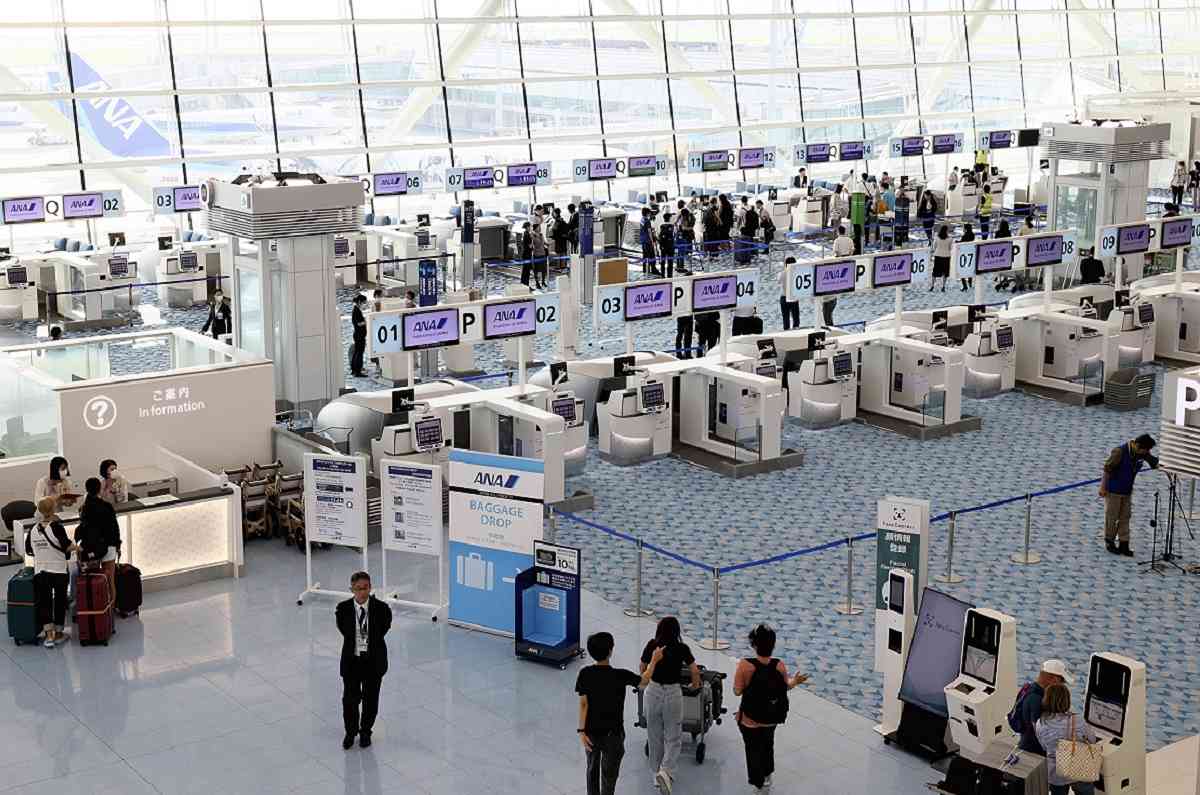Amazing Nippon / Japan’s Public Toilets and Vending Machines Impress Tourists

An Australian tourist poses for a photo in front of the “see-through toilet” at Yoyogi Fukamachi Mini Park in Tokyo.
By Hiromi Kanekita and Midori Yamamura / Yomiuri Shimbun Staff Writers
12:19 JST, August 9, 2023
This is the fifth and final installment of a series exploring places that attract overseas visitors, allowing them to deepen their knowledge of Japan’s charms.
***
On a trip to Japan from Australia in mid-July, Ben Radewell was amazed when taking a video of his friend stepping into a glass-walled cube that sits in a corner of a park in Shibuya Ward, Tokyo. The walls fogged up as she entered, making her invisible from the outside.
This cube, located in Yoyogi Fukamachi Mini Park, is a public restroom that was installed by The Tokyo Toilet, a project launched by the Nippon Foundation to change the image of public restrooms as being gloomy and dirty.
The walls are made of special glass that is transparent when the restroom is vacant but once the door is occupied and locked, the glass becomes opaque. Internationally acclaimed architect Shigeru Ban designed the cube to alleviate concerns of cleanliness and safety as one can see whether anyone is already inside.
Upon completion, the restroom drew interest as a “see-through toilet” and even became a tourist attraction among foreign visitors. In fact, Radewell learned about the cube via social media. He said he was surprised by how beautiful and futuristic it is, adding that the toilets everywhere in Japan were wonderful, including those with warm toilet seats that one can control via remote.
Sophia Marino, 40, came from Italy on a family vacation, and her kids couldn’t stop laughing at the novelty. According to Marino, public restrooms in Italy require payment or are dirty. She said she was envious that restrooms are clean everywhere in Japan.
Convenience and cleanliness seen in Japanese daily life is remarkable to many foreign tourists. Japan was ranked first among 117 countries and regions in the 2021 Travel & Tourism Development Index released by the Swiss private research institute World Economic Forum. By category, Japan received high marks for its transportation infrastructure, public safety and cleanliness.

Haneda Airport has a reputation for cleanliness. International flight facilities at Terminal 2 reopened on July 19 after closure caused coronavirus pandemic.
One of the cleanest public facilities is Haneda Airport. In an annual ranking published by a British rating agency, Haneda Airport has been named the World’s Cleanest Airport for eight consecutive years since 2016. Will Bailey, 49, who arrived from the United Kingdom, said that disembarking at a clean airport always makes him feel welcome. He also wondered why there was so little garbage on the streets despite there being so few trash cans in Japan.
Foreign tourists find the large number of vending machines dotted throughout the city, including at train stations and major facilities, unusual as well. Lucinda Ward, 29, from the United States was happy as she could buy water anywhere especially when going sightseeing in the hot weather. There are vending machines in her country, she said, but the drink selection and their locations are limited. In Japan, they could be placed anywhere because it is safe, she said.
Japan is ‘like a theme park’
“Convenience stores being open 24 hours a day and trains running on time are all fresh and amazing for foreign tourists. The whole country is like a theme park,” said John Daub, an American who produces a YouTube channel promoting Japan.
A resident of Japan for over 20 years, Daub, who was interviewed in Japanese, said the country has been getting cleaner and more comfortable through the renovation of public facilities and the increased Wi-Fi access.
“Even little things that Japanese people take for granted in their daily lives can be a tourism resource. It would be a good idea to take advantage of the perspectives of foreign tourists to emphasize Japan’s appeal,” he said.
Most Read
Popular articles in the past 24 hours
-

Voters Using AI to Choose Candidates in Japan's Upcoming General ...
-

Japan's Snow-Clad Beauty: Camellia Flowers Seen in Winter Bloom a...
-

Monkey Strikes Junior High School Girl from Behind in Japan's Yam...
-

Genichiro Inokuma's Mural in Ueno Station That Gave Hope in Postw...
-

Senior Japanese Citizens Return to University to Gain Knowledge, ...
-

Heavy Snow Linked to 30 Deaths across Japan since Late Jan.; JMA ...
-

Tokyo Police Arrest Head of Resignation Assistance Firm
-

Foreign and Security Policy: Political Parties Must Discuss How T...
Popular articles in the past week
-

Japan Institute to Use Domestic Commercial Optical Lattice Clock ...
-

Australian Woman Dies After Mishap on Ski Lift in Nagano Prefectu...
-

Foreign Snowboarder in Serious Condition After Hanging in Midair ...
-

Chinese Embassy in Japan Reiterates Call for Chinese People to Re...
-

Narita Airport, Startup in Japan Demonstrate Machine to Compress ...
-

Toyota Motor Group Firm to Sell Clean Energy Greenhouses for Stra...
-

Sakie Yokota, Last Surviving Parent of a North Korea Abductee, Ur...
-

Beer Yeast Helps Save Labor, Water Use in Growing Rice; Govt Hope...
Popular articles in the past month
-

Univ. in Japan, Tokyo-Based Startup to Develop Satellite for Disa...
-

JAL, ANA Cancel Flights During 3-day Holiday Weekend due to Blizz...
-

China Confirmed to Be Operating Drilling Vessel Near Japan-China ...
-

China Eyes Rare Earth Foothold in Malaysia to Maintain Dominance,...
-

M6.2 Earthquake Hits Japan's Tottori, Shimane Prefectures; No Tsu...
-

Japan Institute to Use Domestic Commercial Optical Lattice Clock ...
-

Japan, Qatar Ministers Agree on Need for Stable Energy Supplies; ...
-

Japan, Italy to Boost LNG Cooperation; Aimed at Diversifying Japa...
Top Articles in Society
-

JAL, ANA Cancel Flights During 3-day Holiday Weekend due to Blizzard
-

Record-Breaking Snow Cripples Public Transport in Hokkaido; 7,000 People Stay Overnight at New Chitose Airport
-

Australian Woman Dies After Mishap on Ski Lift in Nagano Prefecture
-

Foreign Snowboarder in Serious Condition After Hanging in Midair from Chairlift in Nagano Prefecture
-

Train Services in Tokyo Resume Following Power Outage That Suspended Yamanote, Keihin-Tohoku Lines (Update 4)
JN ACCESS RANKING
-

Univ. in Japan, Tokyo-Based Startup to Develop Satellite for Disaster Prevention Measures, Bears
-

JAL, ANA Cancel Flights During 3-day Holiday Weekend due to Blizzard
-

China Confirmed to Be Operating Drilling Vessel Near Japan-China Median Line
-

China Eyes Rare Earth Foothold in Malaysia to Maintain Dominance, Counter Japan, U.S.
-

Japan Institute to Use Domestic Commercial Optical Lattice Clock to Set Japan Standard Time







